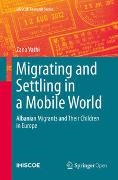Read more
This open access book draws on award-winning cross-generational research comparing the complex and life-changing processes of settlement among Albanian migrants and their adolescent children in three European cities: London (UK), Thessaloniki (Greece), and Florence (Italy). Building on key concepts from the social sciences and migration studies, such as identity, integration and transnationalism, the author links these with emerging theoretical notions, such as mobility, translocality and cosmopolitanism. Ethnic identities, transnational ties and integration pathways of the youngsters and adults are compared, focusing on intergenerational transmission in particular and recognizing mobility as an inherent characteristic of contemporary lives. Departing from the traditional focus on the adult children of settled migrants and the main immigration countries of continental North-Western Europe, this study centres on Southern Europe and Great Britain and a very recently settled immigrant group. The result is an illuminating early look at a second generation "in-the-making". Indeed, the findings provide ample grounds for pragmatic and forward-looking policy to enable these migrant-origin youngsters, and others like them, to more fully attain their potential.
The book ends with a call to reassess the term "second generation" as it is currently used in policy and scholarly works. Children of migrants seldom see themselves as a particular and homogeneous group with ethnicity as an intrinsic identifying quality. More importantly, they make use of all the limited resources at their disposal, and view their integration processes through broader geographies - showing sometimes a cosmopolitan orientation, but also using localized reference points, such as the school, city, or urban neighbourhood.
List of contents
Preface.- 1: Introduction.- 2: Identities of the first and the second generation: the role of ethnicity.- 3: Integration: national, city and local perspectives.-4: Transnational ties and attitudes towards return.- 5: Intergenerational transmission of ethnic identity, integration and transnational ties.- 6: A cross-generational assessment of identification, integration and transnational ties.- References.
Summary
This open access book draws on award-winning cross-generational research comparing the complex and life-changing processes of settlement among Albanian migrants and their adolescent children in three European cities: London (UK), Thessaloniki (Greece), and Florence (Italy). Building on key concepts from the social sciences and migration studies, such as identity, integration and transnationalism, the author links these with emerging theoretical notions, such as mobility, translocality and cosmopolitanism. Ethnic identities, transnational ties and integration pathways of the youngsters and adults are compared, focusing on intergenerational transmission in particular and recognizing mobility as an inherent characteristic of contemporary lives. Departing from the traditional focus on the adult children of settled migrants and the main immigration countries of continental North-Western Europe, this study centres on Southern Europe and Great Britain and a very recently settled immigrant group. The result is an illuminating early look at a second generation “in-the-making”. Indeed, the findings provide ample grounds for pragmatic and forward-looking policy to enable these migrant-origin youngsters, and others like them, to more fully attain their potential.
The book ends with a call to reassess the term “second generation” as it is currently used in policy and scholarly works. Children of migrants seldom see themselves as a particular and homogeneous group with ethnicity as an intrinsic identifying quality. More importantly, they make use of all the limited resources at their disposal, and view their integration processes through broader geographies – showing sometimes a cosmopolitan orientation, but also using localized reference points, such as the school, city, or urban neighbourhood.
Report
Zana Vathi's multi-sited ethnography is a must-read for scholars interested in 'second generation migrants'. She compares the integration pathways of Albanian migrants and their descendants across three cities - London, Thessaloniki and Florence. The result is an original and theoretically stimulating book which sheds new light on this debate.
Janine Dahinden, University of Neuchâtel, Switzerland

